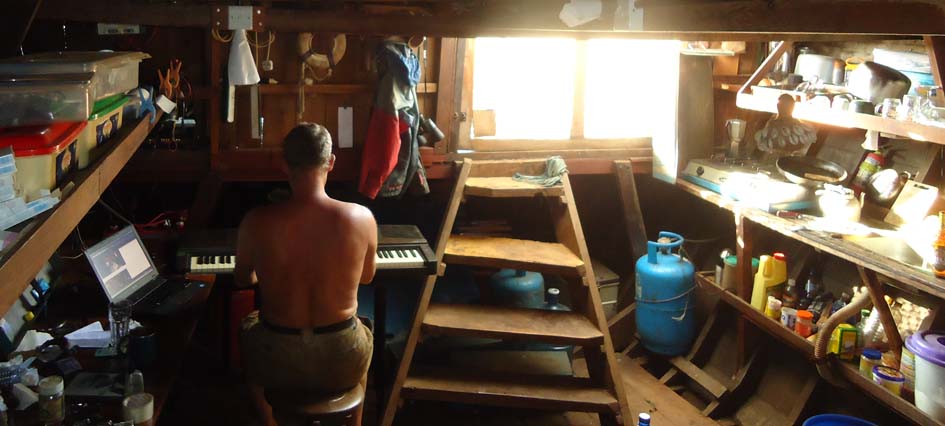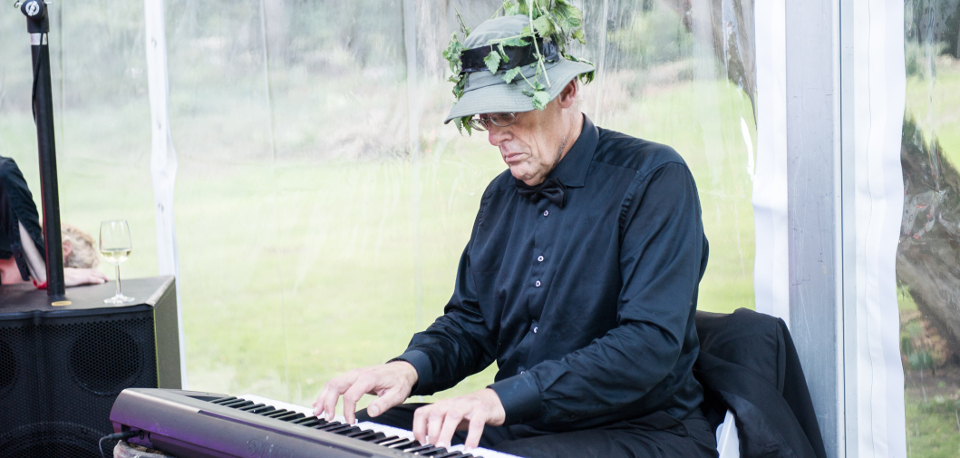
... Jazz Ville Kampala, deliberately off livery to keep the guest player profile. I'm not even going to tell you what these guys have to survive on ...
| Lingeblog Home |
| Previous |
| Next |
Crtd 15-10-31 Lastedit 20-12-27
Piano Breakthrough
Once you have given up it happens
I am a jazz saxophone player. A second rate jazz saxophone player. This means I can play any jazz standard with any jazz ensemble, but the top ones would prefer to have a better guy. If there was nobody else ... and they had been asked to bring sax ... they might hazard me (if they knew me).
That is what a second rate jazz saxophone player is. He is not the one where the phone rings all day. At least not in the Netherlands. Kampala and Nairobi, that's another matter. There, they have awesome jazz saxophone players (as you would guess from the awesome ethnic African jawbone structure) but those guys tend to crash on more sophisticated changes in harmony that you have in lots of jazz songs audiences like to hear. So for the straight stretches they have them, and I can't compete: the energy of African timing!! But for the harmonic curves everybody looks at me. My modus vivendi is: not requiring any wages in exchange for appearing at random. This works and is appreciated. I regularly play in all big hotels and other main jazz venues of Kampala (3 million inhabitants).

... Jazz Ville Kampala, deliberately off livery to keep the guest player profile. I'm not even going to tell you what these guys have to
survive on ...
No chance for me to get on this type of stage in the Netherlands. Here they all can do what I can, many of them better. A lot of murky timing to African standards but nobody notices. This is Holland. And they all wave with their "conservatory"-certificate (the name says it all). Score papers on stage enhance the impressive intellectual atmosphere. And they are all perfectly sure that if you play an E on C minor you need a teacher. Playing with a guy doing such things, like me, is risking your reputation.
My modus operandi in jazz bars - in Africa, and in Holland before I left - is: when I see papers on stage I don't play. They play with paper or they play with me. If the stage is clean of papers, I join, and first blend in what is already there: the tones I hear from the piano and the base, a rhythm the drummer may take the initiative to suggest. That tonal reaction of mine is meant to sound like home to the other players and to lure them out of their cocoons, get more daring. If I succeed I simply follow the advancing crowd. Then we might get somewhere, sometimes (say, twice an evening a minute or so) we really get somewhere. Some unexpected common groove that brings everybody together, band and audience. Thus I occasionally did some nice things, ranging as far as from a duet with pianist Jeroen van Vliet (long ago, before he stopped playing standards) to one with a turkey (yes we got that common groove!) and meetings with some some Kampala reggae bands [genuine African low resolution videos: Bloodbrothers and Kamulireggae].
The problem of playing sax on my own is the absence of a band to relate to. To me, that's the whole fun of it. So at home, playing piano is more fun, I can search for my own groove, but that's an altogether different ball game.
I already try piano for a long time. I use it to study jazz pieces I do not know. That works: "typing" score symbols ("Bb-7, G#maj7, ...") on piano and listening to hear the sound of what I "type". This is what often is called piano playing but I call it piano typing. I never made any progress towards anything like being able to get any build-up in improvisation and dropping the visual score information, and forgetting all that's between your ears and your fingers, like I do on sax, I short: I never managed to really play the piano.
I would have liked to reach that stage, but concluded either my brains were not wired up to it, or I started too late in life.
But my Nairobi circles featured a Dutch girl Lydia who liked to sing jazz. And she had a digital piano. We decided on a list of four standards. When in my dhow near Kampala I would concentrate on those four when playing the digital piano, playing, as I was determined to, without the visual aid of chord symbols.

... On my Lake Victoria dhow preparing for accompanying
Lydia in Nairobi private
parties ...
I made some progress in these four tunes but very, very, very slowly. Remembering the basic harmony changes even kept taking time and effort. I told myself to enjoy what I did and forget about ever getting at a decent stage.
Thus things went on for a year or five, six... really until last spring (2015). But I remember once, September 2014, moored in the harbour of Hylpen, a picturesque village at the Frisian coast of IJssel Lake, having been drunk enough to ask permission to board the piano ("I am a piano player" ...) of quite a decent restaurant, was requested to play softer, got no applause, but was not kicked off until I got fed up myself, in a crammed dining hall.
Then came what I now think was the moment: Lydia's daughter Jessica, 15, classical piano player, far far better than me, wanted to learn how to play songs you know by heart, just like that. No paper. I told her we first had to find how her brains controlled play. So I asked her to sing a short line. Any. Then find the notes.
That foundered completely. She could not sing, she said.
"OK, we stop for now. I have to think".
We stopped. I started reading my book. She turned on some music and sang the whole song at perfect pitch ... totally oblivious of the presence of someone she just told she could not sing.
So I had to think more.
OK, I concluded, then we go the other way. She shall be her own radio first. I told her to play the C-major scale and sing with it. She could!
"Now you sing with everything you play, the classical stuff too!", I said, "once you get confortable with that we do the next step".
Of course she didn't. My charisma never has been much to boast of.
I wanted her - in the end - to find on piano the scale in which she found herself singing a song. For she naturally could not, as I could as a small kid on my recorder, just play the easiest scale for a while and then tune your voice to sing the song in that key, then play it like that, on the easy scale. I remember my little nieces, older than me, playing recorder at Christmas, seeing me walking around behind the cat while playing Silent Night in what they thought was the wrong key for not in their score book: "how do you do that?". I remember the question made me feel shy. Hell I had no clue ... I was six or so.
Jessica turned out to have been taught all sharp scales. She showed me. I noticed her teacher's fingering instructions were better than what I was doing. "Now you do the same starting on the black ones". She is very bright. I did not have to tell her those were five keys exactly and this practice did fit in her life style. She learned them.
"Now up and down, then over the entire keyboard up and down".
And that's where my visit ended that time.
At home, my thoughts were with those exercises I had given her and realized I myself was not so good at them: I had made no clear decisions for every scale how to put my fingers. Jesse's fingering of her sharp scales looked like the best to adopt. "Starting on the black ones" required more deliberation. I wrote my decisions down, which were much in the spirit of how I had seen Jessica playing her sharp scales, changed them a bit, and started practicing. For months I felt no urge to play a song. My head was full with fingers and scales. No more space there. Every now and then I made another revision of a fingering table. Up and down the scale, up and down the entire keyboard.
And that did the trick somehow, up there in my neural network, I am not sure exactly how: after those weeks, when I tried to play a song by heart, I regularly saw, for instance my left little finger reach (quite far!) for a base tone I wanted to hear. And to my utter surprise, many times it would be the one!

... Willemien had heard me playing on my
birthday last July...
Jessica forgot about her ambitions to improvise. But Willemien, the daughter of my oldest sister had heard me playing on my birthday. She asked me to come and play at her marriage reception. I planned to come and play sax with a piano player but all decent ones I know were busy or on holiday. So I asked her whether we should give up or I would come as her marriage reception pianist.
She opted for #2.
I had 8 weeks.
At Willemien's Great Day I arrived at the scenic park venue of the marriage with my digital piano and no scores. I had the piano routines of some 20 jazz standards wired up firmly in my neural network. The only non tonal anchors I had stored were the keys in which to play the songs ( "Mood Indigo A-flat"). But after some excellent wines this soon lapsed into my old sax-routine. What I know as a sax player when they say they are going to play Mood Indigo is: "usually the first note is a D". Now, for piano, that's a C. And when you do a trial starting at C you soon hear that indeed this is basically the scale of A-flat on C-instruments like piano. Now my freshly built-up piano key memory had been erased by the - truly excellent - wine, I used my firm old existing 500+ songs sax memory. The only problem was that, since on sax I play any song in any key, I half forgot the original keys (of the standard jazz "Real Book", or the classical recording). But in the mumbling of a reception I fooled around a bit and found the standard key (that I really needed for I had used in my home practice).
So, as it stands, if I give my neurosystem the "first note" of one of 20 tunes, it maps - imperfectly, but it does! - all that should - or could - come afterwards on an ordered pair consisting of one of my fingers and a key that finds itself, within reach, on the board. That is: I do not type godforsaken written score instructions, I play.

... immortalized by "Sanne Bridal
Photography" ... dress code prescribed a touch of green
...
I got highly flattering reviews. The bride, for instance, wrote me: "we were truly delighted to have you as our marriage reception pianist. We were so satisfied to see how you enjoyed it yourself and fortunately we witnessed no untimely departure of guests whatsoever!"
As a 64 year old, I firmly believe that it is a good omen to get such positive assessments already at this very first stage of my promising piano career.
Postscript: Continued at:
| Lingeblog Home |
| Previous |
| Next |